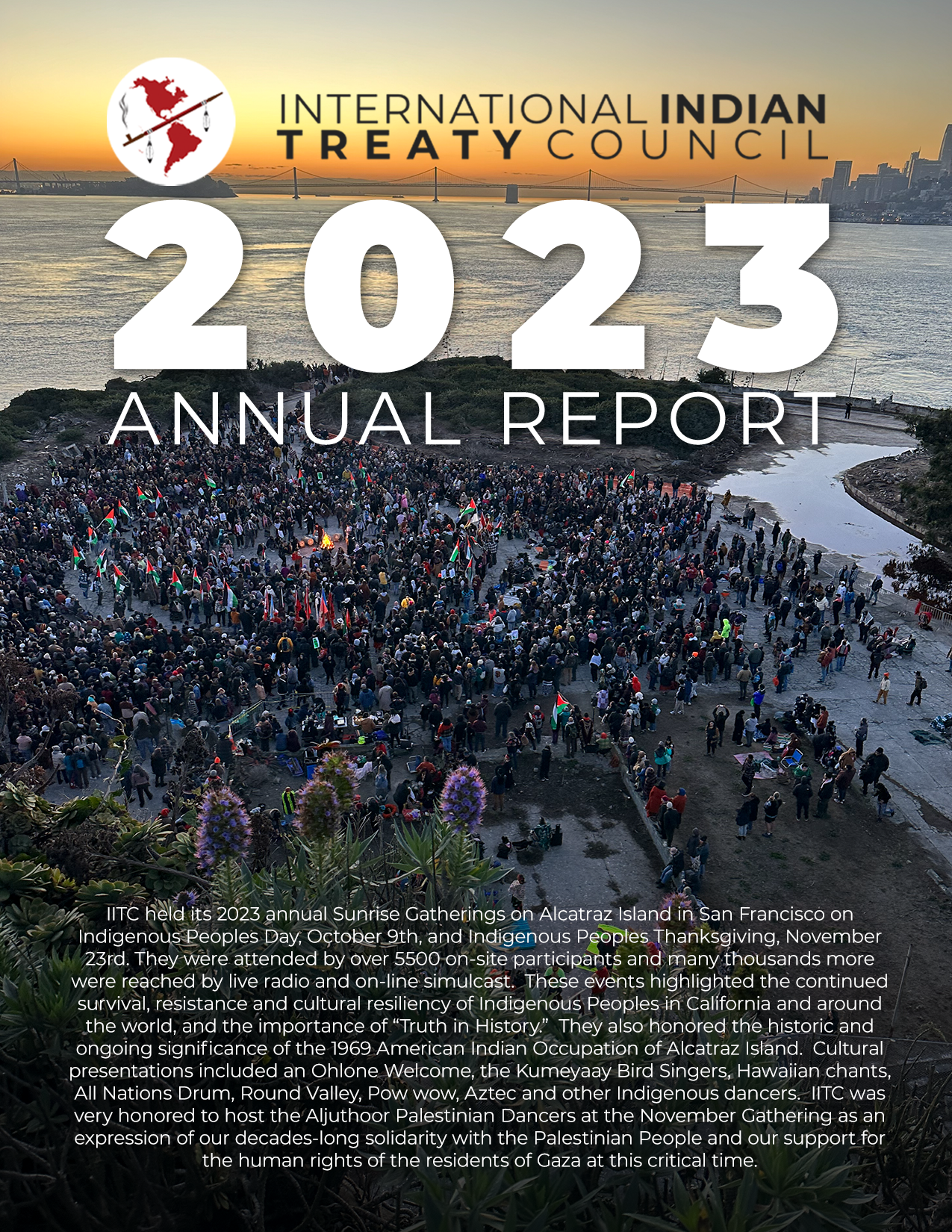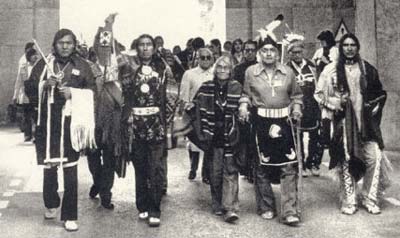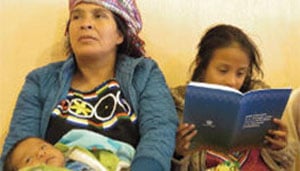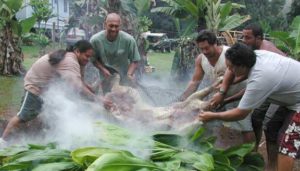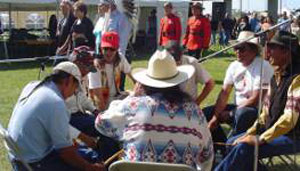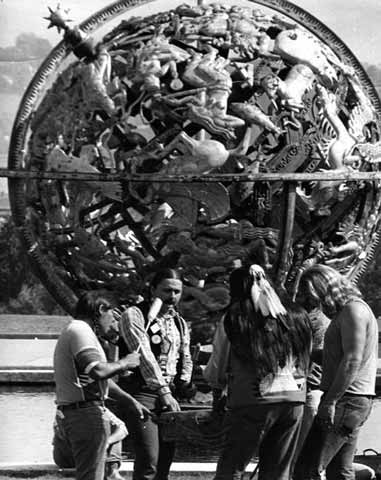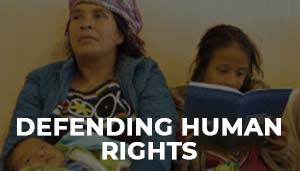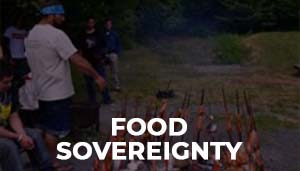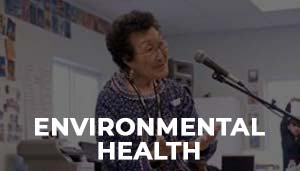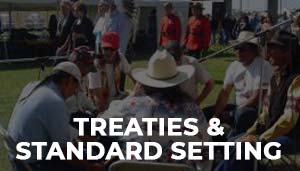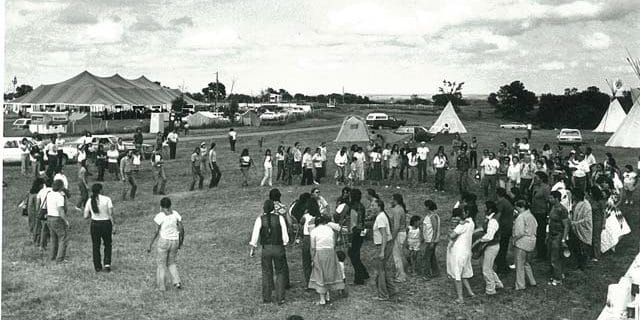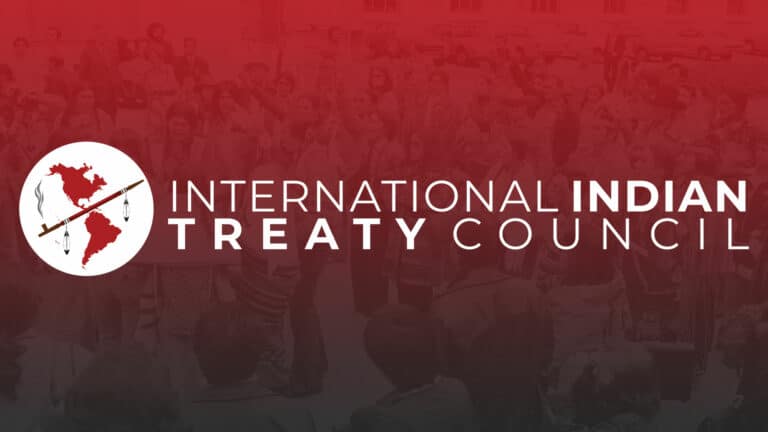
March 28, 2022
Director Lazare Eloundou Assomo
[email protected]
World Heritage Centre
UNESCO
7, Place de Fontenoy
75352 Paris CEDEX07
France
Attached: List of Supporter and Affiliate Organizations
The International Indian Treaty Council (IITC) calls on the United Nations Educational, Scientific and Cultural Organization (UNESCO) to implement an immediate moratorium on creating new World Heritage Sites and calls upon UNESCO to monitor the activities of all parties involved in the implementation and maintenance of World Heritage Sites that are already established, and to implement a transparent, effective redress mechanism to ensure that the rights of Indigenous Peoples are fully respected, upheld and implemented on an ongoing basis. IITC also calls for full and transparent disclosure of all private, public, U.N. and NGO funding and financial transactions involved in the establishment, implementation and maintenance of Protected and Conservation Areas including World Heritage Sites and National Parks, and that this information be made available upon the request of the impacted Indigenous Peoples without delay.
The International Indian Treaty Council is an organization of Indigenous Peoples from North, Central, South America, the Caribbean and the Pacific working for the Sovereignty and Self Determination of Indigenous Peoples and the recognition and protection of Indigenous Rights, Treaties, Traditional Cultures and Sacred Lands. In 1977, IITC became the first Indigenous Peoples’ organization to be recognized as a Non-Governmental Organization (NGO) with Consultative Status to the United Nations Economic and Social Council. In 2011, IITC was the first Indigenous organization to be upgraded to General Consultation Status in recognition of its active role in a wide range of international bodies and processes to ensure that the rights of Indigenous Peoples are recognized, respected and upheld.
UNESCO has implemented several World Heritage Sites that violate the rights of and harm Indigenous Peoples.
UNESCO World Heritage Committee has accepted petitions from Thailand and Tanzania to list the Kaeng Krachan Forest Complex and the Ngorongoro National Park, respectively, as World Heritage Sites even though Indigenous Peoples and human rights experts have expressed their concerns over doing so.
In Thailand, the Karen are facing mass forced evictions, mass arrests,1 including at least one child, and their houses have been burnt.2 Although, the World Heritage Committee denied petitions from Thailand twice, it accepted the third petition in 2021. For the Kaeng Krachan Forest Complex.3 Additionally, independent human rights monitors have been denied access to the Forest Complex by the Thailand Government.4
In Tanzania, the Maasai are facing 70,000 evictions as a recommendation from the World Heritage Committee under a “fortress conservation” approach.5 Despite nearly 500 organizations signing a letter by the Indigenous Peoples Rights International organization in February 2022 stating their concern over conservation sites in Tanzania and the treatment of the Maasai, the UNESCO Heritage Commission recommended a limit to human presence of the Ngorongoro National Park.6
Both of these examples show how the UNESCO World Heritage Committee, as stated by the Special Rapporteur on the Rights of Indigenous Peoples, Francisco Cali Tzay, “has adopted commitments towards Indigenous Peoples on paper but in practice does not have working methods that allow Indigenous Peoples to participate effectively and have their voices heard in the nomination process.”7
Other examples of UNESCO ignoring human rights obligations for Indigenous Peoples in its designations of World Heritage Sites include:
- The Salonga National Park in the Democratic Republic of Congo, in which the Mongo, Mbole, and the Twa that face extreme violence from eco-guards,8 including murder, sexual violence, torture, destruction of property and excessive and unlawful use of force.9
- The Western Ghats in India, in which the Adivasis of Kerala face large land dispossession. UNESCO and the Indian government failed to make public requested information by the International Union for Conservation of Nature before the 35th session of the World Heritage Committee which effectively withheld information from the Adivasis of Kerala and prevented them from responding at the 35th session.10
- The Chitwan National Park in Nepal, in which Chepang face destruction of homes, forced eviction, and torture.11
These are but a few examples of many Indigenous Peoples adversely affected by UNESCO World Heritage Site designations.
Further, Article 41 of the U.N. Declaration on the Rights of Indigenous Peoples states:
The organs and specialized agencies of the United Nations system and other intergovernmental organizations shall contribute to the full realization of the provisions of this Declaration through the mobilization, inter alia, of financial cooperation and technical assistance. Ways and means of ensuring participation of Indigenous Peoples on issues affecting them shall be established.
Additionally, Article 42 states:
The United Nations, its bodies, including the Permanent Forum on Indigenous Issues, and specialized agencies, including the country level, and States shall promote respect for and full application of the provisions of this Declaration and follow up the effectiveness of this Declaration.
UNESCO and the World Heritage Committee are failing to ensure that Indigenous Peoples are effectively involved, including engaging in the free, prior and informed consent of Indigenous Peoples in the designation of World Heritage Sites. All U.N. bodies must implement the U.N. Declaration of the Rights of Indigenous Peoples in full force.
Moreover, the IITC is gravely concerned over the use of para-militarized forces and eco- guards to enforce the “conservation” of World Heritage Sites, effectively dispossessing, murdering, sexually assaulting, torturing, and criminalizing Indigenous Peoples worldwide.
Until these concerns can be fully addressed to the satisfaction of effected Indigenous Peoples, the IITC calls on UNESCO to:
- Implement an immediate moratorium on the creation of new World Heritage
- Closely monitor the activities of all parties involved in the implementation and maintenance of World Heritage Sites that are already established.
- Implement a transparent, effective redress mechanism to ensure that the rights of Indigenous Peoples are fully respected, upheld and implemented on an ongoing
- The full and transparent disclosure of all private, public, N. and NGO funding and financial transactions involved in the establishment, implementation and maintenance of Protected and Conservation Areas including World Heritage Sites and National Parks. This information must be made available upon the request of the impacted Indigenous Peoples without delay.
Signatories and Supporters of the International Indian Treaty Council’s Call to Action re: U.N. Educational, Scientific and Cultural Organization (UNESCO)
Supporters from the 47th Anniversary Treaty Conference held March 1-3, 2022
- Centro papa la autonomía y Desarrollo de los pueblos indígenas (CADPI)
- Proyecto de Desarrollo Rural Integral Vicente Guerrero A.C.
- Asociación de Forestería de Guatemala Utz Che’ (buen Árbol)
- Asociación de Asentamientos Unidos del Área Ixil, Nebaj Quiché-ASAUNIXIL
- Asociación de Abogadas Indigenas Chomija
- Federación Indígena Empresarial y Comunidades Locales de México A.C. (CIELO)
- Movimiento Juventud Kuna
- Pueblo Terena
- MOVIMIENTO NACIONAL DE TEJEDORAS MAYA DE GUATEMALA
- Asociación Ak’tenamit
- Fundación Rigoberta Menchú Tum
- Movimiento Nacional de Comadronas Nim Alaxik
- CONFEDERACIÓN DE MUJERES INDÍGENAS CAMPESINAS POR LA PAZ MOLBAL IXOJ
- Asociación de Mujeres Abogadas Indígenas
- Instituto Mesoamericano de Permacultura IMAP
- Unidad de la Fuerza Indígena y Campesina (UFIC)
- Consejo de Ajq’ijab’ Oxlajuj Ajpop/Centro de Investigación de la Ciencia Maya Oxlajuj Baqtun
- Asociación de Abogados y Notorios Mayas de Guatemala
- Fratemid Oslajuj B’actun
- ASECSA
- Coordinadora Nacional de Viudas de Guatemala CONAVIGUA
- Foro Internacional de Mujeres Indígenas
- Consejo Coordinador Del Pueblo Xinka de Guatemala
- Comité Pro-Mantenimiento de Bienes Comunales y Titulo Territorial
- Alianza de autoridades ancestrales ajpop Tinamit
- Asociación Bugete Jurídico Popular, Universidad Maya Kaqchikel/Guatemala
- Jittoa Bat Nataka Weria
- Caribbean Amerindian Development Organization
- Consejo de Autoridad Ancestral de Santiago Sacatepépuez
- Comité de unidad
- Schaghticoke First Nations
- Comité de Unidad Campesina/ CUC
- ASAMBLEA NACIONAL INDIGENA PLURAL FOR LA AUTONOMIA (ANIPA)
Affiliates of IITC
Latin America Region, Central America
Guatemala:
- Defensoria Maya
- Fundacion Rigoberta Menchu
- Comite de la Unidad Campesina (CUC)
- Centro de Proyectos para el Desarrollo Integral Indígena (CEPRODI)
- Centro Pluricultural para la Democracia (CPD)
- Oxlajuj Ajpop de los Ajq’ijab’ (Conferencia Nacional de Ministros de la Espiritualidad Maya de Guatemala)
- Consejo de los Aj’quija’b
- La Union Nacional Campesina
- Coordinadora Nacional de Viudas de Guatemala (CONAVIGUA)
- Asociación de Asentamientos Unidos del Área Ixil -ASAUNIXIL-
Panama:
- Movimiento de la Juventud Kuna Asociación Napguana
- Congreso General Kuna
- Fundación Para la Promoción de Conocimiento Indígena
El Salvador:
- Asociación Nacional Indígena de El Salvador (ANIS)
Nicaragua:
- Consejo de Ancianos de la Nación Comunitaria Moskitia
- Centro para la Autonomía y Desarrollo de los Pueblos Indígenas (CADPI)
Mexico:
- Congreso Nacional Indigena de Mexico
- Asamblea Nacional Indígena Plural por la Autonomía (ANIPA),
- Consejo de Pueblos Nahuas del Alto Balsas, Guerrero, A.C.
- Traditional Authorities, Pueblo de Huirivis, Rio Yaqui, Sonora
- Traditional Authorities, Pueblo de Potam, Rio Yaqui, Sonora
- Traditional Authorities, Pueblo de Torim, Rio Yaqui, Sonora
- Traditional Authorities, Pueblo de Bacum, Rio Yaqui, Sonora
- Unidad De la Fuerza Indígena y Campesina (UFIC)
- Red Indigena de Turismo A.C. (RITA)
- Jittoa- Bat-Natika-Weria (Río Yaqui, Sonora)
- Di Sugave a Nana Shimjai, San Francisco Magu
- Proyecto de Desarollo Rural Integral Vicente Guerrero A.C.
- Asemblea de los Pueblos Indígenas por la Soberanía Alimentaria en México (APISA)
Latin American Region, South America
Chile:
- Ad-MAPU
Brazil:
- Indigenous Women’s Educational Group (GRUMIN)
Argentina:
- Asociación Indígena Argentina (AIRA)
- Asociación de Mujeres Abogadas Indigenas (AMAI)
Ecuador:
- La Confederación de Nacionalidades Indígenas del Ecuador (CONAIE: Shuar, Achuar, Siona, Secoya, Cofán, Huaorani, Záparo, Chachi, Tsáchila, Awá, Epera, Manta, Wancavilca and Quichua Indigenous Peoples).
Columbia:
- Organización Nacional Indígena de Colombia (ONIC)
- Uw’a Nation
Bolivia:
- La Confederación Nacional de Naciones Indígenas Originarias de Bolivia (CONNIOB)
Caribbean Region:
- United Confederation of Taino People: Borikén (Puerto Rico), Kiskeia, (Dominican Republic),
- Barbados, Guyana (Arawaks), Bimini (United States)
- Caribbean Amerindian Development Organisation (CADO)
North America Region
United States:
- National Native American Prisoners’ Rights Coalition
- White Clay Society/Blackfoot Confederacy (Montana)
- Indigenous Environmental Network (IEN)
- Columbia River Peoples (Washington/Oregon)
- Rural Coalition Native American Task Force (Minnesota)
- Yoemem Tekia Foundation, Pascua Yaqui Nation (Arizona)
- Tohono O’odham Nation Traditional community (Arizona)
- Pit River Tribe (California)
- Wintu Nation (California)
- Redding Rancheria (California)
- Tule River Nation (California)
- Muwekma Ohlone Nation (California)
- Coyote Valley Pomo Nation (California)
- Round Valley Pomo Nation (California)
- Oklahoma Region Indigenous Environmental Network (Oklahoma)
- Wanblee Wakpeh Oyate (South Dakota)
- IEN Youth Council
- Independent Seminole Nation of Florida (Florida)
- Cactus Valley/Red Willow Springs Big Mountain Sovereign Dineh Community (Arizona)
- Leonard Peltier Defense Committee
- Eagle and Condor Indigenous Peoples’ Alliance (Oklahoma)
- Seminole Sovereignty Protection Initiative (Oklahoma)
- Mundo Maya (California)
- Los Angeles Indigenous Peoples Alliance (California)
- American Indian Treaty Council Information Center (Minnesota) Vallejo Inter-Tribal Council (California)
- Three Fires Ojibwe Cultural and Education Society (Minnesota)
- California Indian Environmental Alliance (CIEA)
- Wicapi Koyaka Tiospaye (South Dakota)
- Mvskoke Food Sovereignty Initiative (Oklahoma)
- Light is Life Youth Food Sovereignty Project
- Buffalo Council (Colorado/National)
- Oce Vpofa/Hickory Grounds Tribal Town (Alabama/Oklahoma)
- United Tribes of Michigan
- Alliance of Colonial Era Tribes (ACET) (Haliwa Saponi Indian Tribe, Lenape Indian Tribe of Delaware, Lipan Apache Tribe of Texas, Lumbee Tribe, Monacan Indian Nation, MOWA
- Band of Choctaw, Nanticoke Indian Tribe, Nanticoke Lenni-Lenape Tribal Nation, Pocasset Tribe, Rappahannock Tribe, United Houma Nation, Upper Mattoaponi)
- Inhanktonwan Treaty Committee (Yankton Sioux Tribe)
- Sicangu Lakota Treaty Council (Rosebud Sioux Tribe)
- Schaghticoke First Nations
Canada:
- Sovereign Nations of Treaties 1 – 11 (227 Treaty Nations in Canada)
Arctic Region
Alaska:
- Native Village of Venetie Tribal Government/Arctic Village Traditional Council
- Chickaloon Village Traditional Council, Chickaloon Native Village
- Stevens Village Traditional Council
- Native Village of Eklutna
Pacific Region:
Hawaii:
- Sovereign Nation of Hawaii
- Aloha First, Hawaii
Aotearoa/New Zealand:
- Kirikiriroa Marae
- Tauranga Moana Marae
- Maori Women’s Resource Center
- Te Whanua o te Rau Aroha
- Waitangi Action Committee
- Nuclear Free and Independent Pacific Network
- Te Paepae Arahi Trust
- Te Manu Kawe I te Matauranga
- Te Rau Matatini
Maluku
- Bangsa AdatAlifuru in Maluku (The Indigenous Alifuru People of Maluku)
- Saniri Alifuru (Alifuru Council)
West Papua
- Dewan Adat Papua (Papua Customary Council)
Multi Regional/Multi-National:
- North-South Indigenous Network Against Pesticides
- International Indian Women’s Environmental and Reproductive Health Network
- Indigenous Peoples Working Group on Toxics
1 https://news.trust.org/item/20210727103427-u2dal
2 https://www.ohchr.org/en/NewsEvents/Pages/DisplayNews.aspx?NewsID=27333&LangID=E
3 https://www.ohchr.org/en/NewsEvents/Pages/DisplayNews.aspx?NewsID=27333&LangID=E
4 https://www.ohchr.org/en/NewsEvents/Pages/DisplayNews.aspx?NewsID=27333&LangID=E
5 https://iprights.org/news-and-events/press-releases/media-statement-on-the-threats-of-eviction-of- maasai-pastoralists-in-lo-liondo-area-and-the-ngorongoro-national-park-in-tanzania
6 https://iprights.org/news-and-evhttps://iprights.org/news-and-events/press-releases/media- statement-on-the-threats-of-eviction-of-maasai-pastoralists-in-lo-liondo-area-and-the-ngorongoro- national-park-in-tanzaniaents/press-releases/media-statement-on-the-threats-of-eviction-of-maasai- pastoralists-in-lo-liondo-area-and-the-ngorongoro-national-park-in-tanzania
7 https://www.ohchr.org/en/NewsEvents/Pages/DisplayNews.aspx?NewsID=27333&LangID=E
8 https://e360.yale.edu/features/green-violence-eco-guards-are-abusing-indigenous-groups-in-africa
9 https://www.rainforestfoundationuk.org/media/abf196ba-89da-4680-8df3-af5d382f7d5f
10 https://iwgia.org/images/documents/popular-publications/world-heritage-sites-final-eb.pdf, 233-241
11https://www.researchgate.net/publication/358009095_UNESCO_World_Heritage_and_Human_Rights_Compliance
Share this post
UNESCO Call to Action
March 28, 2022
Director Lazare Eloundou Assomo
[email protected]
World Heritage Centre
UNESCO
7, Place de Fontenoy
75352 Paris CEDEX07
France
Attached: List of Supporter and Affiliate Organizations
The International Indian Treaty Council (IITC) calls on the United Nations Educational, Scientific and Cultural Organization (UNESCO) to implement an immediate moratorium on creating new World Heritage Sites and calls upon UNESCO to monitor the activities of all parties involved in the implementation and maintenance of World Heritage Sites that are already established, and to implement a transparent, effective redress mechanism to ensure that the rights of Indigenous Peoples are fully respected, upheld and implemented on an ongoing basis. IITC also calls for full and transparent disclosure of all private, public, U.N. and NGO funding and financial transactions involved in the establishment, implementation and maintenance of Protected and Conservation Areas including World Heritage Sites and National Parks, and that this information be made available upon the request of the impacted Indigenous Peoples without delay.
The International Indian Treaty Council is an organization of Indigenous Peoples from North, Central, South America, the Caribbean and the Pacific working for the Sovereignty and Self Determination of Indigenous Peoples and the recognition and protection of Indigenous Rights, Treaties, Traditional Cultures and Sacred Lands. In 1977, IITC became the first Indigenous Peoples’ organization to be recognized as a Non-Governmental Organization (NGO) with Consultative Status to the United Nations Economic and Social Council. In 2011, IITC was the first Indigenous organization to be upgraded to General Consultation Status in recognition of its active role in a wide range of international bodies and processes to ensure that the rights of Indigenous Peoples are recognized, respected and upheld.
UNESCO has implemented several World Heritage Sites that violate the rights of and harm Indigenous Peoples.
UNESCO World Heritage Committee has accepted petitions from Thailand and Tanzania to list the Kaeng Krachan Forest Complex and the Ngorongoro National Park, respectively, as World Heritage Sites even though Indigenous Peoples and human rights experts have expressed their concerns over doing so.
In Thailand, the Karen are facing mass forced evictions, mass arrests,1 including at least one child, and their houses have been burnt.2 Although, the World Heritage Committee denied petitions from Thailand twice, it accepted the third petition in 2021. For the Kaeng Krachan Forest Complex.3 Additionally, independent human rights monitors have been denied access to the Forest Complex by the Thailand Government.4
In Tanzania, the Maasai are facing 70,000 evictions as a recommendation from the World Heritage Committee under a “fortress conservation” approach.5 Despite nearly 500 organizations signing a letter by the Indigenous Peoples Rights International organization in February 2022 stating their concern over conservation sites in Tanzania and the treatment of the Maasai, the UNESCO Heritage Commission recommended a limit to human presence of the Ngorongoro National Park.6
Both of these examples show how the UNESCO World Heritage Committee, as stated by the Special Rapporteur on the Rights of Indigenous Peoples, Francisco Cali Tzay, “has adopted commitments towards Indigenous Peoples on paper but in practice does not have working methods that allow Indigenous Peoples to participate effectively and have their voices heard in the nomination process.”7
Other examples of UNESCO ignoring human rights obligations for Indigenous Peoples in its designations of World Heritage Sites include:
- The Salonga National Park in the Democratic Republic of Congo, in which the Mongo, Mbole, and the Twa that face extreme violence from eco-guards,8 including murder, sexual violence, torture, destruction of property and excessive and unlawful use of force.9
- The Western Ghats in India, in which the Adivasis of Kerala face large land dispossession. UNESCO and the Indian government failed to make public requested information by the International Union for Conservation of Nature before the 35th session of the World Heritage Committee which effectively withheld information from the Adivasis of Kerala and prevented them from responding at the 35th session.10
- The Chitwan National Park in Nepal, in which Chepang face destruction of homes, forced eviction, and torture.11
These are but a few examples of many Indigenous Peoples adversely affected by UNESCO World Heritage Site designations.
Further, Article 41 of the U.N. Declaration on the Rights of Indigenous Peoples states:
The organs and specialized agencies of the United Nations system and other intergovernmental organizations shall contribute to the full realization of the provisions of this Declaration through the mobilization, inter alia, of financial cooperation and technical assistance. Ways and means of ensuring participation of Indigenous Peoples on issues affecting them shall be established.
Additionally, Article 42 states:
The United Nations, its bodies, including the Permanent Forum on Indigenous Issues, and specialized agencies, including the country level, and States shall promote respect for and full application of the provisions of this Declaration and follow up the effectiveness of this Declaration.
UNESCO and the World Heritage Committee are failing to ensure that Indigenous Peoples are effectively involved, including engaging in the free, prior and informed consent of Indigenous Peoples in the designation of World Heritage Sites. All U.N. bodies must implement the U.N. Declaration of the Rights of Indigenous Peoples in full force.
Moreover, the IITC is gravely concerned over the use of para-militarized forces and eco- guards to enforce the “conservation” of World Heritage Sites, effectively dispossessing, murdering, sexually assaulting, torturing, and criminalizing Indigenous Peoples worldwide.
Until these concerns can be fully addressed to the satisfaction of effected Indigenous Peoples, the IITC calls on UNESCO to:
- Implement an immediate moratorium on the creation of new World Heritage
- Closely monitor the activities of all parties involved in the implementation and maintenance of World Heritage Sites that are already established.
- Implement a transparent, effective redress mechanism to ensure that the rights of Indigenous Peoples are fully respected, upheld and implemented on an ongoing
- The full and transparent disclosure of all private, public, N. and NGO funding and financial transactions involved in the establishment, implementation and maintenance of Protected and Conservation Areas including World Heritage Sites and National Parks. This information must be made available upon the request of the impacted Indigenous Peoples without delay.
Signatories and Supporters of the International Indian Treaty Council’s Call to Action re: U.N. Educational, Scientific and Cultural Organization (UNESCO)
Supporters from the 47th Anniversary Treaty Conference held March 1-3, 2022
- Centro papa la autonomía y Desarrollo de los pueblos indígenas (CADPI)
- Proyecto de Desarrollo Rural Integral Vicente Guerrero A.C.
- Asociación de Forestería de Guatemala Utz Che’ (buen Árbol)
- Asociación de Asentamientos Unidos del Área Ixil, Nebaj Quiché-ASAUNIXIL
- Asociación de Abogadas Indigenas Chomija
- Federación Indígena Empresarial y Comunidades Locales de México A.C. (CIELO)
- Movimiento Juventud Kuna
- Pueblo Terena
- MOVIMIENTO NACIONAL DE TEJEDORAS MAYA DE GUATEMALA
- Asociación Ak’tenamit
- Fundación Rigoberta Menchú Tum
- Movimiento Nacional de Comadronas Nim Alaxik
- CONFEDERACIÓN DE MUJERES INDÍGENAS CAMPESINAS POR LA PAZ MOLBAL IXOJ
- Asociación de Mujeres Abogadas Indígenas
- Instituto Mesoamericano de Permacultura IMAP
- Unidad de la Fuerza Indígena y Campesina (UFIC)
- Consejo de Ajq’ijab’ Oxlajuj Ajpop/Centro de Investigación de la Ciencia Maya Oxlajuj Baqtun
- Asociación de Abogados y Notorios Mayas de Guatemala
- Fratemid Oslajuj B’actun
- ASECSA
- Coordinadora Nacional de Viudas de Guatemala CONAVIGUA
- Foro Internacional de Mujeres Indígenas
- Consejo Coordinador Del Pueblo Xinka de Guatemala
- Comité Pro-Mantenimiento de Bienes Comunales y Titulo Territorial
- Alianza de autoridades ancestrales ajpop Tinamit
- Asociación Bugete Jurídico Popular, Universidad Maya Kaqchikel/Guatemala
- Jittoa Bat Nataka Weria
- Caribbean Amerindian Development Organization
- Consejo de Autoridad Ancestral de Santiago Sacatepépuez
- Comité de unidad
- Schaghticoke First Nations
- Comité de Unidad Campesina/ CUC
- ASAMBLEA NACIONAL INDIGENA PLURAL FOR LA AUTONOMIA (ANIPA)
Affiliates of IITC
Latin America Region, Central America
Guatemala:
- Defensoria Maya
- Fundacion Rigoberta Menchu
- Comite de la Unidad Campesina (CUC)
- Centro de Proyectos para el Desarrollo Integral Indígena (CEPRODI)
- Centro Pluricultural para la Democracia (CPD)
- Oxlajuj Ajpop de los Ajq’ijab’ (Conferencia Nacional de Ministros de la Espiritualidad Maya de Guatemala)
- Consejo de los Aj’quija’b
- La Union Nacional Campesina
- Coordinadora Nacional de Viudas de Guatemala (CONAVIGUA)
- Asociación de Asentamientos Unidos del Área Ixil -ASAUNIXIL-
Panama:
- Movimiento de la Juventud Kuna Asociación Napguana
- Congreso General Kuna
- Fundación Para la Promoción de Conocimiento Indígena
El Salvador:
- Asociación Nacional Indígena de El Salvador (ANIS)
Nicaragua:
- Consejo de Ancianos de la Nación Comunitaria Moskitia
- Centro para la Autonomía y Desarrollo de los Pueblos Indígenas (CADPI)
Mexico:
- Congreso Nacional Indigena de Mexico
- Asamblea Nacional Indígena Plural por la Autonomía (ANIPA),
- Consejo de Pueblos Nahuas del Alto Balsas, Guerrero, A.C.
- Traditional Authorities, Pueblo de Huirivis, Rio Yaqui, Sonora
- Traditional Authorities, Pueblo de Potam, Rio Yaqui, Sonora
- Traditional Authorities, Pueblo de Torim, Rio Yaqui, Sonora
- Traditional Authorities, Pueblo de Bacum, Rio Yaqui, Sonora
- Unidad De la Fuerza Indígena y Campesina (UFIC)
- Red Indigena de Turismo A.C. (RITA)
- Jittoa- Bat-Natika-Weria (Río Yaqui, Sonora)
- Di Sugave a Nana Shimjai, San Francisco Magu
- Proyecto de Desarollo Rural Integral Vicente Guerrero A.C.
- Asemblea de los Pueblos Indígenas por la Soberanía Alimentaria en México (APISA)
Latin American Region, South America
Chile:
- Ad-MAPU
Brazil:
- Indigenous Women’s Educational Group (GRUMIN)
Argentina:
- Asociación Indígena Argentina (AIRA)
- Asociación de Mujeres Abogadas Indigenas (AMAI)
Ecuador:
- La Confederación de Nacionalidades Indígenas del Ecuador (CONAIE: Shuar, Achuar, Siona, Secoya, Cofán, Huaorani, Záparo, Chachi, Tsáchila, Awá, Epera, Manta, Wancavilca and Quichua Indigenous Peoples).
Columbia:
- Organización Nacional Indígena de Colombia (ONIC)
- Uw’a Nation
Bolivia:
- La Confederación Nacional de Naciones Indígenas Originarias de Bolivia (CONNIOB)
Caribbean Region:
- United Confederation of Taino People: Borikén (Puerto Rico), Kiskeia, (Dominican Republic),
- Barbados, Guyana (Arawaks), Bimini (United States)
- Caribbean Amerindian Development Organisation (CADO)
North America Region
United States:
- National Native American Prisoners’ Rights Coalition
- White Clay Society/Blackfoot Confederacy (Montana)
- Indigenous Environmental Network (IEN)
- Columbia River Peoples (Washington/Oregon)
- Rural Coalition Native American Task Force (Minnesota)
- Yoemem Tekia Foundation, Pascua Yaqui Nation (Arizona)
- Tohono O’odham Nation Traditional community (Arizona)
- Pit River Tribe (California)
- Wintu Nation (California)
- Redding Rancheria (California)
- Tule River Nation (California)
- Muwekma Ohlone Nation (California)
- Coyote Valley Pomo Nation (California)
- Round Valley Pomo Nation (California)
- Oklahoma Region Indigenous Environmental Network (Oklahoma)
- Wanblee Wakpeh Oyate (South Dakota)
- IEN Youth Council
- Independent Seminole Nation of Florida (Florida)
- Cactus Valley/Red Willow Springs Big Mountain Sovereign Dineh Community (Arizona)
- Leonard Peltier Defense Committee
- Eagle and Condor Indigenous Peoples’ Alliance (Oklahoma)
- Seminole Sovereignty Protection Initiative (Oklahoma)
- Mundo Maya (California)
- Los Angeles Indigenous Peoples Alliance (California)
- American Indian Treaty Council Information Center (Minnesota) Vallejo Inter-Tribal Council (California)
- Three Fires Ojibwe Cultural and Education Society (Minnesota)
- California Indian Environmental Alliance (CIEA)
- Wicapi Koyaka Tiospaye (South Dakota)
- Mvskoke Food Sovereignty Initiative (Oklahoma)
- Light is Life Youth Food Sovereignty Project
- Buffalo Council (Colorado/National)
- Oce Vpofa/Hickory Grounds Tribal Town (Alabama/Oklahoma)
- United Tribes of Michigan
- Alliance of Colonial Era Tribes (ACET) (Haliwa Saponi Indian Tribe, Lenape Indian Tribe of Delaware, Lipan Apache Tribe of Texas, Lumbee Tribe, Monacan Indian Nation, MOWA
- Band of Choctaw, Nanticoke Indian Tribe, Nanticoke Lenni-Lenape Tribal Nation, Pocasset Tribe, Rappahannock Tribe, United Houma Nation, Upper Mattoaponi)
- Inhanktonwan Treaty Committee (Yankton Sioux Tribe)
- Sicangu Lakota Treaty Council (Rosebud Sioux Tribe)
- Schaghticoke First Nations
Canada:
- Sovereign Nations of Treaties 1 – 11 (227 Treaty Nations in Canada)
Arctic Region
Alaska:
- Native Village of Venetie Tribal Government/Arctic Village Traditional Council
- Chickaloon Village Traditional Council, Chickaloon Native Village
- Stevens Village Traditional Council
- Native Village of Eklutna
Pacific Region:
Hawaii:
- Sovereign Nation of Hawaii
- Aloha First, Hawaii
Aotearoa/New Zealand:
- Kirikiriroa Marae
- Tauranga Moana Marae
- Maori Women’s Resource Center
- Te Whanua o te Rau Aroha
- Waitangi Action Committee
- Nuclear Free and Independent Pacific Network
- Te Paepae Arahi Trust
- Te Manu Kawe I te Matauranga
- Te Rau Matatini
Maluku
- Bangsa AdatAlifuru in Maluku (The Indigenous Alifuru People of Maluku)
- Saniri Alifuru (Alifuru Council)
West Papua
- Dewan Adat Papua (Papua Customary Council)
Multi Regional/Multi-National:
- North-South Indigenous Network Against Pesticides
- International Indian Women’s Environmental and Reproductive Health Network
- Indigenous Peoples Working Group on Toxics
1 https://news.trust.org/item/20210727103427-u2dal
2 https://www.ohchr.org/en/NewsEvents/Pages/DisplayNews.aspx?NewsID=27333&LangID=E
3 https://www.ohchr.org/en/NewsEvents/Pages/DisplayNews.aspx?NewsID=27333&LangID=E
4 https://www.ohchr.org/en/NewsEvents/Pages/DisplayNews.aspx?NewsID=27333&LangID=E
5 https://iprights.org/news-and-events/press-releases/media-statement-on-the-threats-of-eviction-of- maasai-pastoralists-in-lo-liondo-area-and-the-ngorongoro-national-park-in-tanzania
6 https://iprights.org/news-and-evhttps://iprights.org/news-and-events/press-releases/media- statement-on-the-threats-of-eviction-of-maasai-pastoralists-in-lo-liondo-area-and-the-ngorongoro- national-park-in-tanzaniaents/press-releases/media-statement-on-the-threats-of-eviction-of-maasai- pastoralists-in-lo-liondo-area-and-the-ngorongoro-national-park-in-tanzania
7 https://www.ohchr.org/en/NewsEvents/Pages/DisplayNews.aspx?NewsID=27333&LangID=E
8 https://e360.yale.edu/features/green-violence-eco-guards-are-abusing-indigenous-groups-in-africa
9 https://www.rainforestfoundationuk.org/media/abf196ba-89da-4680-8df3-af5d382f7d5f
10 https://iwgia.org/images/documents/popular-publications/world-heritage-sites-final-eb.pdf, 233-241
11https://www.researchgate.net/publication/358009095_UNESCO_World_Heritage_and_Human_Rights_Compliance
